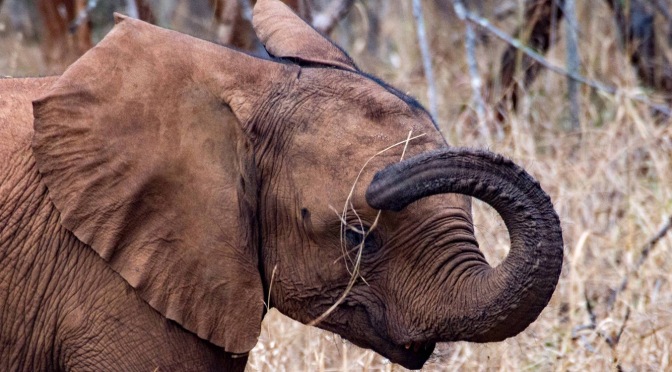The impact of elephant poaching for ivory or bushmeat goes far and wide as elephants are keystone species known as the landscapers of Africa.

Elephants have voracious appetites to maintain nutrition for their large bodies eating grasses and different parts of trees. They will push down or break branches select trees to eat the roots and bark, this has knock-on effects:
- to create homes for smaller animals and rodents under the leafy branches that now hug the ground,
- protect the ground below allowing the grasses to grow without grazers eating it all up,
- giving smaller animals access to the nutritious leaves from higher branches previously exclusive to giraffes and elephants,
- gives more food like dead branches to termites.
The other impact of elephant poaching is that sometimes baby elephants get left behind! The stress of losing their mother, having to fend for themselves and not having the resources to do so greatly affects their survival rate.

A number of organisations around Africa have rescued these orphans and create facilities to nurture these animals back to health and eventual release them back in the wild.
I had the fortune to visit one such facility on the outskirts of Lusaka, Zambia: Game Ranger International’s Elephant Orphanage Project Nursery. Their philosophy is simple:
- Orphaned baby elephant survival and capacity to return to the wild is priority.
- Use the site for education and promotion of conservation.


Because of priority number one, human interaction with these gorgeous creatures is limited and at a distance- which I 100% support and love. This gives the elephant the best chance to survive in the wild and also means they don’t look to humans to survive and hopefully will less likely rampage through a neighbouring village feeling like it’s part of the tribe!

GRI is doing fantastic work in a holistic manner to save the elephants in Zambia:
- They have this orphanage project comprising of nursery and release facility, where older elephants are reassimilated into the wild and introduced/adopted into matriarchal herds.
- Anti-poaching unit patrolling Kafue National Park, running investigations and pinning the syndicate poaching network down in a few of the layers, not just the poachers themselves.
- Community outreach programs empowering surrounding villages so they don’t turn to poaching for a quick buck, become self-sufficient beyond just surviving, learn to appreciate wildlife and become willing to report wildlife crime.
Their community outreach has been really effective and includes school projects, women’s groups and a radio program with reminders of wildlife crime reporting to a hotline after every show!

I am excited about these guys as they have a genuine desire to effectively solve this issue and a willingness to collaborate and share their lessons learnt with others who legitimately want the same outcomes.
GRI need support as they recently got their funding halved due to a long term donor restrategising their allocations! We are hoping to support their efforts through Elephant Cooperation too!

